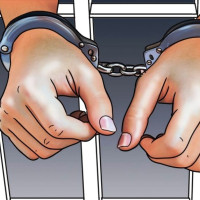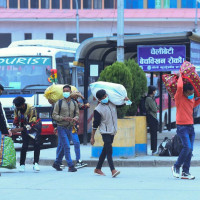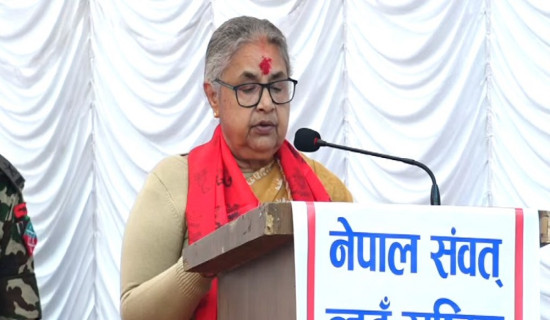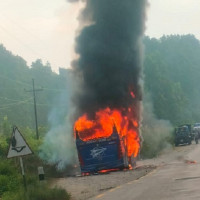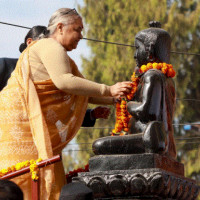- Wednesday, 22 October 2025
Century-old suspension bridge on verge of collapse
BY BASUDEV SHARMA,Jajarkot, Apr. 29: A century-old suspension bridge connecting Matela in Bheri Municipality-11 and Syal Khola in Chaurjahari Municipality-3 in Rukum West is in a dilapidated state due to the negligence on the part of concerned authorities and lack of maintenance.
The bridge serves as a major route for residents of Ward Nos. 1 to 13 in Bheri Municipality, including the district headquarters, Khalanga, to access the Chaurjahari market.
In lack of maintenance, the bridge has continued to deteriorate. About 15 years ago, when there was no other bridge over the Bheri River, most villagers from Jajarkot used this bridge to travel to cities like Nepalgunj, Surkhet and Kathmandu. Among the suspension bridges in western Nepal, the Matela bridge of Bheri Municipality-11 was once considered one of the strongest, but it is now falling apart.
Locals transporting food products produced in Chaurjahari Municipality, goods carried by horses and mules, government officials and general travelers all used this bridge regularly. However, during the armed conflict led by the CPN-Maoist, the Maoists damaged the bridge by removing its planks to disrupt the movement of local administrations and government offices, leading to its current fragile condition.
According to Mukti Prasad Acharya, a leader of the Nepali Congress from Bheri Municipality-11, about 25 years ago, a toll was collected to cross the bridge and the funds collected by the then District Development Committee (DDC) were used for bridge maintenance. Currently, with none of the three levels of government showing interest in repairs, locals are forced to risk their lives to cross the bridge.
Two years ago, a woman returning home from Chaurjahari Mission Hospital after receiving treatment fell from the bridge and was injured.
During the time when the bridge was fully operational, local businesses flourished and the government also benefited from the toll revenue. However, as motorcycles began to cross the bridge and with no maintenance or business activity now, the bridge's condition has become miserable. Due to the local government’s lack of interest in repairs, people continue to cross, risking their lives.
The bridge, built a hundred years ago, once had an annual maintenance budget allocated by the DDC. In the past, pedestrians paid 25 paisa, horses and mules were charged one rupee and goats 50 paisa for crossing. Among the suspension bridges of the then Mid-Western Region, it was considered one of the strongest.
The bridge was originally constructed to facilitate trade and strengthen ties between Jajarkot and Rukum, which are separated by the Bheri River. According to local accounts, Rana Prime Minister Chandra Shumsher ordered the construction of the bridge after Colonel Haribram Shah’s daughter, Bal Kumari Shah, married Rana ruler Chandra Shumsher in 1906. When the Queen expressed concern about the lack of a bridge to visit her maternal home in Jajarkot, the Chandra Shumsher ordered the construction of this bridge, which was completed in 1923.
Today, with the construction of new motorable roads reaching villages, old heritage structures like this bridge have been neglected.
Bishnu Giri of Bheri Municipality-11 said that over a hundred motorcycles cross the bridge daily, yet due to the negligence of the concerned authorities, the bridge has become extremely hazardous.
According to Janak KC, President of the Jajarkot Heritage Conservation Foundation, poor maintenance and lack of initiative from local governments have forced people to cross it taking risks.
Previously, the suspension bridge connected many areas, including Barekot Rural Municipality, Nalagad Municipality, Aathbiskot Municipality and Dolpa district residents to Chaurjahari, Nepalgunj and Surkhet.




